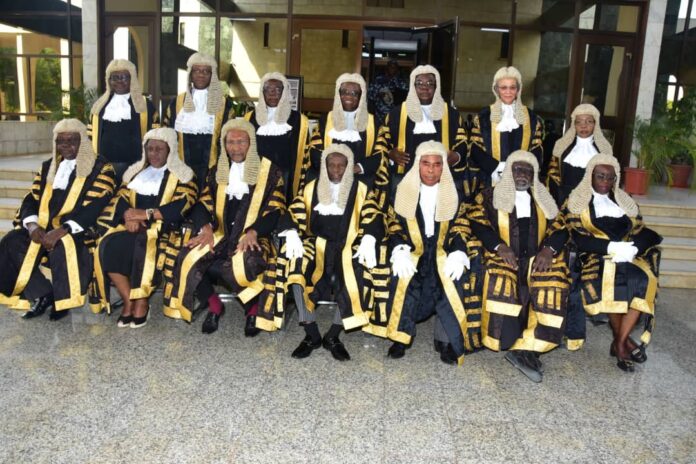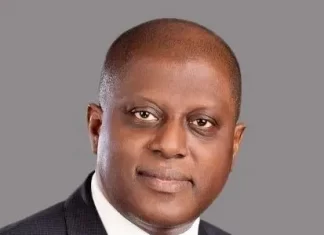Judicial officers express concern, say nomination ignores due process
By Jeph Ajobaju, Chief Copy Editor
Some serving and retired Justices have questioned the list of 22 nominees to the Supreme Court released by the Federal Judicial Service Commission (FJSC), criticising the process as politicised.
“Never in the history of Nigeria has appointment of Supreme Court Justices been this politicised,” one Justice said.
He cited the case of the North Central where the son of a former Chief Justice of Nigeria (CJN) is slated as “priority” while a senior jurist with over 15 years experience in the Court of Appeal is placed as “reserve”.
The strangest thing is that “the South South slot where the person adjudged as the very best is curiously pencilled as reserve,” the Justice added.
Sources disclosed the nominee placed as priority was initially not even shortlisted among the four names sent to the FJSC.
“The question many in the judicial circle are asking is: how did someone who did not make the shortlist suddenly emerge as priority over and above the person adjudged to be the best,” a source wondered.
He said the Justice placed as reserve for the South South now was priority candidate in 2019 but was dropped then because he was considered to be too young at 53.
“How did he suddenly drop four years after when he has been rated so highly? Anyone who wants to check the quality of the Justices can go to the Law Pavilion, which is the electronic law report and see which Justice of the Court Appeal has the highest ratio. The person placed as reserve has the highest ratio.”
In the North West, some Justices wondered how Justice AB Gumel was dropped from the list “despite being the number one on the list of jurists from his zone.”
The source disclosed a Justice in the South West who was a reserve candidate in 2019 is still on the reserve list while a Justice who had never made the shortlist is placed as priority.
Some senior members of the judiciary expressed fear the low morale and rancour in the judiciary will get worse if not urgently addressed.
Reactions also came from lawyers in academia and the Bar, as articulated by Vanguard.
Yemi George, SAN (law professor)
“When I saw the list of those Justices, I felt very proud. I have appeared before many of those Justices and I have worked with many of those Justices at different committee levels, you know. So, they are excellent names.
“Most of those names are excellent names. It is possible that one or two may have entered the list, but I don’t know, but from what I can see and my interaction with those names, they are excellent Justices of the appellate court who merit being in the Supreme Court.”
George also said he is comfortable that no candidate from both legal practice and academia made the list, saying any legal practitioner who wants to become a Justice of the Supreme Court should start from the High Court.
He cited Justice Niki Tobi, a professor of law who he said started his career at the lower Bench and later did very well at the Supreme Court.
In George’s view, many legal practitioners nowadays are party goers with a lot of friends and clients everywhere with love for money, qualities antithetical to what should be found in a Judge.
Sam Erugo, SAN (law professor)
“Personally, I am not surprised at the decision by the FJSC to consider only the Court of Appeal Justices for nomination to fill the vacant slots at the Supreme Court.
“We must appreciate that the judiciary is a conservative institution. Change from the usual practice is difficult. I don’t believe the campaign for change has been rigorous and persuasive enough to achieve the desirable social change.
“Again, the Bench is more organised for the contestation – the Justices can easily be assessed by the number and particularly the quality of recent judgments delivered.
“The Justices are already on the Bench; it is only natural that hardworking Justices of the Court of Appeal would be elevated to the Supreme Court as a reward for hard work.
“In the current scheme of things, the Bar is not strong enough to insist on any slot in appointment to the apex court. The procedure for such an appointment is not settled, and it may cause more division in the judiciary.
“At the least, there must be criteria to assess the competence of a practising lawyer or academic as a candidate for direct appointment to the Supreme Court. We do not have such set criteria yet, and the urgency of the present appointment will not permit the rigours of usual committees to set standards.”
_________________________________________________________________
Related articles:
Akinyemi urges Tinubu to implement Uwais report to change rigged electoral system
Falana seeks judicial review of Appeal Court removal of Kano, Plateau Govs
__________________________________________________________________
CJN and NJC aware of complaints
Sources at both the Office of the CJN and the National Judicial Council (NJC) gave assurances there is nothing to worry about the complaints of the serving and retired Justices.
“The appointment of Justices into the Supreme Court is a process,” explained one source in the Office of the CJN who preferred anonymity.
“While I am not lending any credence to the allegations contained in your question, Paragraph 13 of Part I of the Third Schedule to the 1999 Constitution provides that the Federal Judicial Service Commission (FJSC) shall have powers to advise the National Judicial Council (NJC) in nominating persons for appointment to the office of the CJN, Justice of the Supreme Court, President of the Court of Appeal, Justice of the Court of Appeal, the Chief Judge of the Federal high Court, a Judge of the Federal High Court and the Chairman and members of the Code of Conduct Tribunal, the provision never said the advice shall be mandatorily upheld by the NJC.
“Having said that, the Commission considers a lot of factors in shortlisting candidates including years of service on the bench and the integrity of individual candidates.
“To properly understand my point, consider this scenario: a person may be on the priority list in 2019 as you said, perhaps based on the factor of seniority on the Bench, it may be dropped for a better candidate in 2023.
“This is because four years is a long period of time and it is possible that between 2019 and 2023, a lot of things might have happened. A Judge who has unblemished record in 2019 might have had his record soiled one way or another years after.
“Get me right. I never said that was what happened in the cases you cited but I am only trying to tell you that there could be explanations to the cases you cited.”
NJC not compelled to adopt FJSC priority list
Another source in the NJC clarified the list is not final.
“Don’t forget, only 11 vacancies were declared by the Chief Justice of Nigeria at the Supreme Court. But the FJSC sent 22 names. The NJC cannot send the same list to the President for the assent of the Senate before the appointment is approved,” he said.
“That there were two lists – priority and reserved – shows that the NJC has a job to do.
“I can therefore confirm to you that the practice at the NJC is that all the 22 candidates will be subjected to rigorous interview session while the best 11 amongst them would be picked.
“Sometimes, in exceptional cases, candidates who didn’t make the two lists – priority and reserve – may still make the Supreme Court.
“I can categorically confirm to you that there had been few occasions in the past when the NJC replaced names on the priority list by picking from the reserved list after such candidates were interviewed.
“NJC is not under compulsion to adopt the FJSC’s priority list.
“It is a work in progress. I can assure that the best candidates for the job will be forwarded to the President.”
List of 22 Justices nominated by zone
The list of the 22 Justices for elevation to the Supreme Court show the North Central and South East have six each, North West four, and the North East, South West, and South South have two each.
They include:
North East
- Haruna Simon Tsammani (Bauchi) – Priority
- Abubakar Talba (Adamawa)
North West
- Muhammad Lawal Shuaibu (Jigawa) – Priority
- Bello Aliyu (Zamfara) – Reserve
- Abubakar Sadiq Umar (Kebbi) – Priority
- Abdullahi Mahmud Bayero (Kano) – Reserve
North Central
- Jummai Sankey (Plateau) – Priority
- Muhammad Ibrahim Sirajo (Plateau) – Reserve
- Stephen Adah (Kogi) – Priority
- Ridman Maiwada Abdullahi (Nassarawa) – Reserve
- Baba Idris (Niger) – Priority
- Joseph Ikyegh (Benue) – Reserve
South West
- Adewale Abiru (Lagos) – Priority
- Olubunmi Oyewole (Osun) – Reserve
South East
- Nwaoma Uwa (Abia) – Priority
- Onyekachi Otisi (Abia) – Reserve
- Obande Ogbuinya (Ebonyi) – Priority
- Theresa Orji-Abadua (Imo) – Reserve
- Anthony Ogakwu (Enugu) – Priority
- Chioma Nwosu-lheme (Imo) – Reserve
South South
- Moore Adumein (Bayelsa) – Priority
- Biobele Georgewill (Rivers) – Reserve











